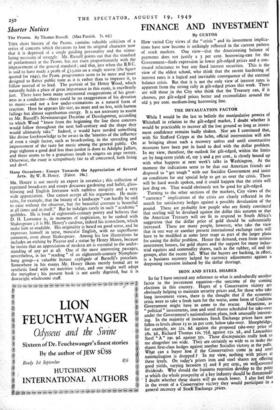Tats short history of the Proms. contains valuable criticism of
a series of concerts which threatens to lose its original character now that it is deprived of a single guiding personality and the stimu- lating necessity of struggle. Mr. Russell points out that the standard of performance at the Proms. has not risen proportionately with the improvement of the general standard ; and that, just when the B.B.C. is said to have made a profit of £15,000 on a single season (the figure quoted for 1945), the Prom. programmes seem to be more and more designed to flatter public taste as it is rather than to improve it, to follow instead of to lead. The portrait of Sir Henry Wood, which naturally holds a place of great importance in this essay, is excellently just. There have been many sentimental exaggerations of his great- ness as a conductor—there could be no exaggeration of his devotion to music—and not a few under-estimations as a natural form of reaction. Here he appears life-size, no more and no less, with human failings but almost superhuman energy. It is not necessary to assent to Mr. Russell's Newmancsque Doctrine of Development, according to which Wood " knew from the beginning the line these concerts would follow throughout the next half-century and the shape they would ultimately take." Indeed, it would have needed something like divine foreknowledge to be aware in the 'nineties of the influence of even a single factor, such as broadcasting, in the spreading and improvement of the taste for music among the general public. On page eighteen a good deal less than justice is done to Adolphe Jullien, and there seems to be a gratuitous insult to singers on page twenty. Otherwise, the essay is scrupulously fair to all concerned, both living and dead.


































 Previous page
Previous page